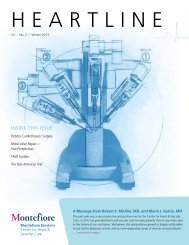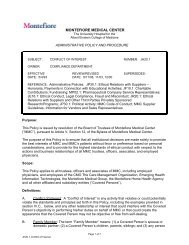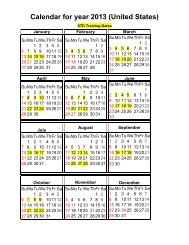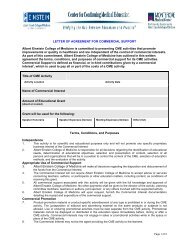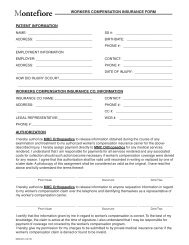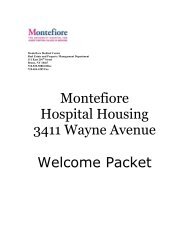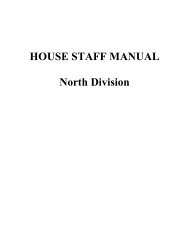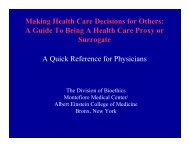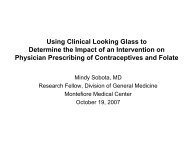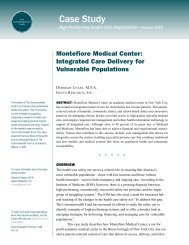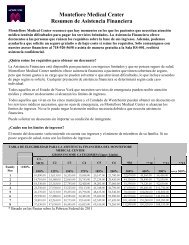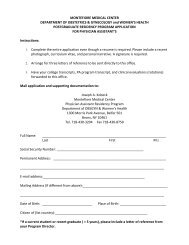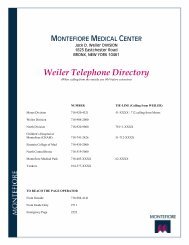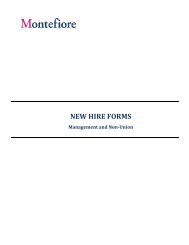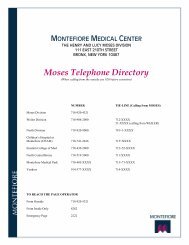Medical Staff House Staff Orientation Manual - Montefiore Medical ...
Medical Staff House Staff Orientation Manual - Montefiore Medical ...
Medical Staff House Staff Orientation Manual - Montefiore Medical ...
You also want an ePaper? Increase the reach of your titles
YUMPU automatically turns print PDFs into web optimized ePapers that Google loves.
VERBAL, TELEPHONE, OR FAXED CONTROLLED SUBSTANCE ORDERS<br />
• Are allowed for inpatients in emergency situations only. An emergency is defined as the<br />
immediate administration of the controlled substance is needed for proper treatment and no<br />
alternative treatment is available.<br />
• Are permitted only if it is not possible for the practitioner to provide a written order before<br />
the needed administration of the drug.<br />
• Can only be provided by an attending physician or fellow<br />
• May be continued by house staff, but is restricted to a one time dose<br />
• Must be signed by the physician within 24 hours.<br />
LOSS OR DISCREPANCY OF A CONTROLLED SUBSTANCE<br />
A loss of a controlled substance, including an unresolved discrepancy must be reported to the<br />
Security Department, Department of Pharmacy and chair or manager of the department. An<br />
investigation of the incident and written report, including a list of all individuals who have had<br />
access to controlled substances and their license numbers, must be submitted to the Department<br />
of Pharmacy. The Department of Pharmacy will complete the Report Form for Loss of<br />
Controlled Substances and submit to the New York State Department of Health Bureau of<br />
Controlled Substances Narcotic Enforcement Unit.<br />
DEA NUMBERS<br />
Under the Federal Controlled Substances Act, a practitioner is required to register with the Drug<br />
Enforcement Agency (DEA) in order to prescribe and administer controlled substances. Certain<br />
house staff physicians are not eligible for a federal registration number (interns and certain<br />
residents). Therefore, provisions have been made under federal law to assign a temporary<br />
number (hospital number plus an assigned suffix number), which authorizes the practitioner to<br />
prescribe controlled drugs within the medical center. Interns and residents rotating at <strong>Montefiore</strong><br />
from other training programs are not eligible for a temporary <strong>Montefiore</strong> DEA number and<br />
suffix.<br />
OUT-PATIENT PRESCRIPTION WRITING<br />
• New York State law requires all prescriptions to have a stamp/imprint in addition to the<br />
prescriber's signature.<br />
• The complete DEA number and suffix must be written on the prescription.<br />
• The assigned number can only be used while employed at the medical center and on<br />
prescriptions written for <strong>Montefiore</strong> patients.<br />
STORAGE AND SECURITY<br />
Controlled substances must be stored in a stationary, secured cabinet with double lock and key to<br />
ensure adequate safeguards and security measures are undertaken to prevent against the loss,<br />
destruction, theft or unauthorized access. Automated point-of-use<br />
technology (Pyxis Medstation System) is an acceptable alternative to a cabinet.<br />
• The cabinet will have inner and outer doors with separate keys. Spring locks or combination<br />
locks are not acceptable.<br />
• When not in use, the keys to the narcotic cabinet must be stored in a secured manner (e.g.,<br />
locked drawer and unavailable to unauthorized personnel).<br />
110



